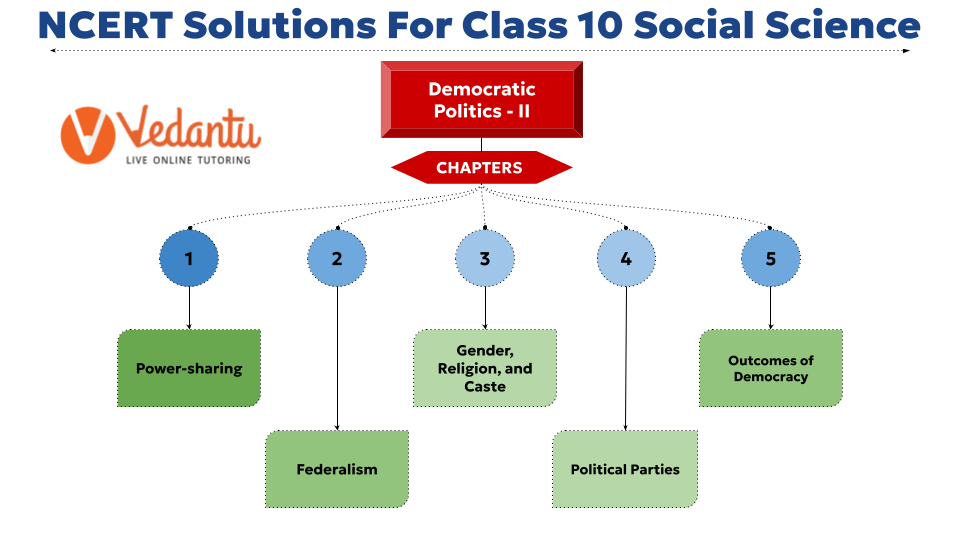Chapter-wise Class 10 Social Science Democratic Politics Questions and Answers Free PDF Download
FAQs on NCERT Solutions For Class 10 Social Science Democratic Politics (2025-26)
1. How can I find correct and step-by-step answers for all the exercises in the Class 10 Civics NCERT textbook?
The NCERT Solutions for Class 10 Civics provide comprehensive, method-based answers for every question in the 'Democratic Politics-II' textbook. These solutions are structured by subject experts to ensure accuracy and adherence to the CBSE curriculum, helping you understand the correct approach to framing your answers for exams.
2. Which chapters are covered in the NCERT Solutions for Class 10 Civics for the 2025-26 session?
These solutions cover all chapters prescribed in the latest CBSE syllabus for Class 10 Civics (Democratic Politics-II) for the 2025-26 academic year. The key chapters included are:
- Chapter 1: Power Sharing
- Chapter 2: Federalism
- Chapter 3: Gender, Religion and Caste
- Chapter 4: Political Parties
- Chapter 5: Outcomes of Democracy
3. How do the NCERT Solutions for Chapter 1, 'Power Sharing', explain the different forms of power distribution?
The solutions for 'Power Sharing' systematically break down the concept into its key forms. They provide clear, point-wise explanations and textbook-based examples for:
- Horizontal distribution of power (among legislature, executive, and judiciary).
- Vertical distribution of power (among different levels of government like central, state, and local).
- Power sharing among different social groups.
- Power sharing among political parties and pressure groups.
4. What is the correct method to solve questions on Federalism, such as the difference between 'coming together' and 'holding together' federations?
The NCERT Solutions for 'Federalism' guide you to answer such comparative questions by using a tabular format or distinct paragraphs. The correct method involves defining each type, highlighting the key differences in their formation and power balance, and providing specific country examples (e.g., USA for 'coming together' and India for 'holding together') as cited in the NCERT textbook.
5. How do the NCERT Solutions for the 'Political Parties' chapter help in answering questions about their functions and challenges?
These solutions structure the answers logically. For questions on functions, they list distinct roles like contesting elections, forming policies, and shaping public opinion, with brief explanations for each. For challenges, they help you address issues like the lack of internal democracy, dynastic succession, and the role of money, enabling you to write well-structured, high-scoring answers.
6. Beyond just giving answers, how do these NCERT Solutions help in understanding the practical application of concepts like decentralisation?
The solutions explain the 'why' behind the concepts. For decentralisation, they clarify the need for local self-governance and detail the structure of the Panchayati Raj system. By explaining the real-world impact of the 73rd and 74th Constitutional Amendments, they help you connect textbook theory to the actual functioning of democracy at the grassroots level in India.
7. If I am stuck on a complex question in the 'Outcomes of Democracy' chapter, what problem-solving approach do the NCERT Solutions recommend?
The solutions promote a structured approach. First, identify the core theme of the question—whether it relates to political, social, or economic outcomes of democracy. Then, gather relevant points from the chapter, such as accountability, responsiveness, and accommodation of social diversity. The solutions demonstrate how to present these points with supporting arguments to build a comprehensive answer.
8. What is a common mistake students make when answering questions on 'Gender, Religion, and Caste', and how do the NCERT Solutions help prevent it?
A common mistake is giving generic opinions instead of arguments based on the textbook. The NCERT Solutions help by focusing on the political expression of these social differences. They guide you to frame answers around concepts like communalism, casteism, and the feminist movement, and to use constitutional provisions to support your points, ensuring the answer is analytical and not just descriptive.
9. How do the NCERT Solutions clarify the fundamental differences between a unitary and a federal system of government?
The solutions provide a clear, comparative analysis. They explain that in a unitary system, power is concentrated with the central government, while in a federal system, power is divided between central and regional governments. The answers highlight key distinguishing features such as jurisdiction, sources of revenue, and constitutional authority, using examples to solidify understanding.
10. Are these NCERT Solutions aligned with the latest CBSE syllabus for the 2025-26 exams?
Yes, all solutions are meticulously updated to align with the latest CBSE Class 10 Social Science syllabus for the 2025-26 academic session. They follow the prescribed curriculum and question patterns, ensuring the content is relevant and accurate for board exam preparation.







































